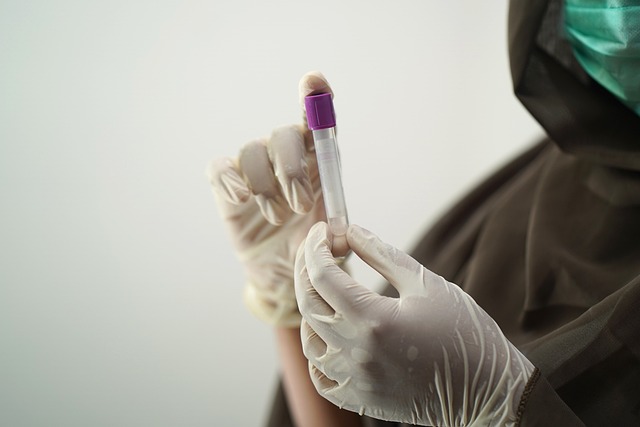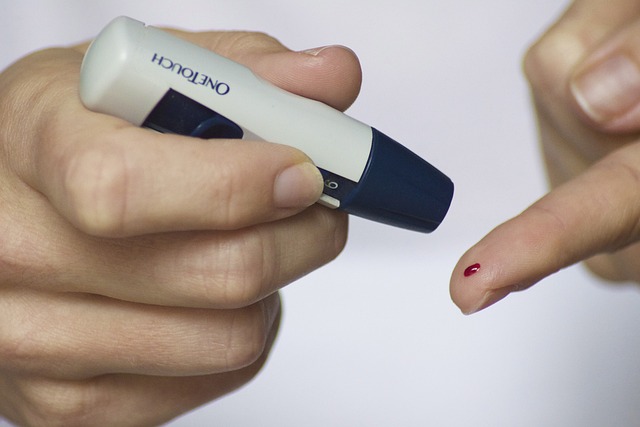The UK Kidney Blood Test is a multifaceted diagnostic tool that provides comprehensive analysis of androgen levels and renal function in men. It measures key hormones like testosterone, DHT, androstenedione, offering insights into male physiology and reproductive health. This test is crucial for diagnosing conditions ranging from infertility to hypogonadism and PCOS in female partners. It also plays a significant role in assessing kidney health due to the interrelation of the endocrine system with renal function. Before administering the test, healthcare professionals conduct thorough consultations to ensure accurate results that facilitate precise diagnoses and tailored treatment plans. The UK Kidney Blood Test is non-invasive and reliable, aiding in the identification of hormonal imbalances and fertility issues by evaluating specific markers such as FSH and LH. It also detects various endocrine disorders impacting male fertility and supports monitoring of treatments. With its advanced analytical methods, the test is an integral part of the UK healthcare system, contributing to improved patient outcomes in reproductive health diagnosis and treatment. The NHS leverages this test to inform evidence-based hormone therapies and interventions, emphasizing personalized care and continuous engagement with new research in endocrinology for optimal patient outcomes.
UK individuals grappling with reproductive health concerns may find clarity through the analysis of male hormone levels, particularly via kidney blood tests. This article delves into the intricacies of androgen assessment, its significance in diagnosing fertility issues, and the spectrum of treatments available. By understanding the role of these tests within the UK’s healthcare system, men can embark on a more informed journey towards addressing their reproductive health challenges. Our comprehensive guide illuminates the path from hormone analysis to tailored therapeutic options, ensuring a nuanced approach to male reproductive wellness.
- Decoding Androgen Levels: A Comprehensive Guide to Male Hormone Analysis for Reproductive Health Diagnosis in the UK
- The Role of Kidney Blood Tests in Assessing Male Hormonal Balance and Its Impact on Fertility
- Navigating the Nuances of Hormone Therapy: Treatment Options and Considerations for Male Reproductive Issues in the UK Context
Decoding Androgen Levels: A Comprehensive Guide to Male Hormone Analysis for Reproductive Health Diagnosis in the UK

Understanding androgen levels is pivotal in diagnosing a myriad of reproductive health issues in men. In the UK, the analysis of male hormones is often conducted through a comprehensive blood test, which includes the assessment of testosterone, dihydrotestosterone (DHT), and androstenedione—key androgens that play vital roles in male physiology. This test is not limited to infertility; it also provides insights into conditions such as hypogonadism, polycystic ovary syndrome (PCOS) in partners, and other androgen-related disorders. The UK Kidney Blood Test encompasses the evaluation of hormone profiles, including androgens, which can be indicative of kidney function, given its close relationship with endocrine systems. This holistic approach ensures that any imbalance or abnormality in androgen levels is identified promptly, facilitating precise diagnosis and effective treatment plans tailored to the individual’s unique health needs.
The process of decoding androgen levels begins with a detailed consultation with healthcare professionals who specialise in hormonal analysis. The UK Kidney Blood Test serves as a foundational diagnostic tool, providing a clear picture of the androgenic landscape within the male body. It is a non-invasive procedure that offers an accurate snapshot of a man’s reproductive health, helping clinicians to pinpoint the underlying causes of fertility issues or other androgen-related conditions. With advanced laboratory techniques and precise measurement capabilities, the UK healthcare system is equipped to interpret these hormone levels, leading to better patient outcomes in the realm of reproductive health diagnosis.
The Role of Kidney Blood Tests in Assessing Male Hormonal Balance and Its Impact on Fertility

In the realm of reproductive health, the assessment of male hormonal balance is pivotal in diagnosing and managing fertility issues. The UK Kidney Blood Test plays a crucial role in this process by providing insight into the patient’s endocrine function, including the production and regulation of hormones that affect sperm production and quality. These hormones, primarily testosterone and follicle-stimulating hormone (FSH), are key to male reproductive health. Testosterone deficiency or imbalance can lead to reduced sperm count, motility, and overall fertility. The kidneys, as part of the endocrine system, are integral to the handling of sex hormones and their by-products, which is why monitoring their function through blood tests can offer valuable data on hormonal status. By evaluating markers such as testosterone levels and estradiol in relation to gonadotropins like LH (luteinizing hormone) and FSH, healthcare providers can pinpoint disruptions in the hormonal balance that may underlie fertility challenges.
Furthermore, the UK Kidney Blood Test is instrumental in detecting conditions such as polycystic ovary syndrome (PCOS), hypogonadism, and other endocrine disorders that can affect male fertility. It also aids in monitoring treatments, including hormone replacement therapies or interventions targeting specific kidney functions that may influence overall hormonal homeostasis. The comprehensive nature of the UK Kidney Blood Test provides a holistic view of the patient’s hormonal profile, enabling healthcare professionals to tailor treatments effectively and improve the chances of conception for couples facing fertility issues. Accurate and timely diagnosis through these tests is essential for early intervention, which can significantly enhance reproductive outcomes for men.
Navigating the Nuances of Hormone Therapy: Treatment Options and Considerations for Male Reproductive Issues in the UK Context

In the UK, navigating the nuances of hormone therapy for male reproductive issues is a complex process that requires a precise understanding of hormonal interplay and its impact on fertility. The UK Kidney Blood Test is a critical diagnostic tool in this context, providing a comprehensive analysis of hormone levels including those affecting the kidneys and endocrine system. It plays an integral role in identifying imbalances that could be indicative of underlying reproductive health concerns. Treatment options for male reproductive issues are varied, ranging from hormone replacement therapy (HRT) to lifestyle modifications, and selective treatments targeting specific conditions such as hypogonadism or polycystic ovary syndrome (PCOS in males). Each patient’s unique physiology necessitates individualised care; therefore, the decision-making process involves careful consideration of the patient’s medical history, symptoms, and overall health. The National Health Service (NHS) provides guidelines and support for these treatments, ensuring that patients have access to evidence-based practices. It is essential for healthcare providers to stay abreast of the latest research and developments in endocrinology to offer the most effective treatment plans tailored to each patient’s needs within the UK context. The ongoing dialogue between clinicians, researchers, and patients is pivotal in refining these therapies, thereby improving outcomes for those facing reproductive health challenges.
In the UK, understanding the intricacies of male reproductive health is pivotal. The analysis of androgen levels through kidney blood tests plays a crucial role in diagnosing reproductive issues, as detailed in our exploration. This comprehensive guide underscores the importance of hormone evaluation and its significance in tailored treatment approaches for fertility concerns. By navigating the nuances of hormone therapy, healthcare providers can offer informed options that align with individual patient needs within the UK context. This scientific approach to reproductive health not only enhances diagnostic accuracy but also paves the way for personalised care, ultimately contributing to better health outcomes for men.
